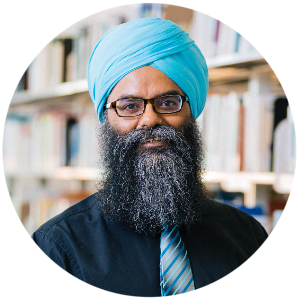 Dr. Dalbir Sehmby (photo: Ryan Whitefield)
Dr. Dalbir Sehmby (photo: Ryan Whitefield)
When I first stepped in front of a class, I couldn't speak.
Moments earlier, I had been printing off the syllabus. The stubborn machine couldn't staple, so I came to the lecture hall early, placed each syllabus sheet down one page next to another on a table in front of the lectern while students thundered into the room. I was going to speak, but my throat protested, so I just nodded, smiled, and gestured towards the piles of syllabus pages.
A young lady responded, "That's our syllabus!" In an impressive display of impromptu organization that would make any military dictatorship proud, the entire class lined up and compiled the syllabus in an efficient and orderly fashion.
Impressed, my throat called off its strike, and my mind re-opened access to my introductory lecture: "This is our textbook . . . it's the only copy, so we'll have to share."
They laughed. Phew. My anxiety subsided . . .
. . . until after the class, when I realized I had to research, develop, and deliver another lecture, and another, and another. That mix of anxiety and excitement has never subsided, for university teaching requires continual adaptation to each new group of students. Moreover, teaching is a skill that demands constant practice as well as an awareness of effective pedagogy.
Here's a little university secret: earning a PhD does not require any formal training, expertise, or experience in teaching. However, if you're one to value the art and skill of university teaching, consider this:
(1) Challenge the "Publish or Perish" binary
Well-rounded academics research, write, serve, teach, and try not lose all of their USB flash drives. Having publishing as our only priority is a luxury, but being an academic is more than meeting a journal deadline. Consider adopting a revised mantra: "Publish, Teach, and Cherish."
(2) Re-think "relief"
Certainly, there's prestige in publishing; hence, professors enjoy "teaching relief" - another term we need to de-construct. If a break from teaching is a relief, then does that imply teaching is a punishment? Herein we have another implicitly problematic worldview. Teaching is not a punishment; it's an honour. If we really want professors to avoid punishment, we should offer "meeting relief."
(3) Translate and Listen
Graduate programs centre on specialized research, so moving from exchanges in academic jargon to reaching a lecture hall of novices requires mental dexterity. Be a translator . . . of yourself - and listen. Listen to your students. We can learn a great deal about teaching/learning from students.
(4) Reflect
Soon after teaching a class, I write a reflection. It not only allows me to build honest self-awareness, but it also helps me track where I am in each lesson - something very useful as we age.
(5) Go to the library
Most of my graduate school training was experiential - a case of being thrown into the Ocean of Academia. Explanations of the pedagogical "How" and "Why" were absent, so I trained myself. Before my first class, I spent weeks researching essay writing standards, English-language standards, brain-based learning, and evidence-based teaching - and it all helped. I've kept up this practice with more recent works, Eyler's How Humans Learn (2018)How Humans Learn (2018), and still consult established ones, Teaching within the Rhythms of the Semester (1995)Teaching within the Rhythms of the Semester (1995).
(6) Be Cooperative
Being cooperative means respecting and valuing the efforts of all instructors. The university is less like the level playing field ideal of the Olympics and more like an ad hoc lottery. Institutional inequality affects teachers, students, and the teaching/learning process. On the one hand, tenured professors can devote time to research and succumb to the "publish or perish" mantra which risks paying less attention to or seeing less value in teaching. On the other hand, sessional/adjunct (or precariat) instructors may be immersed in teaching and unable to pursue research/writing. All instructors, tenured or not, need to work together to create opportunities to share expertise, insights, or research results, and even to engage in research/teaching projects together. Having worked on such cooperative projects, I find them quite rewarding and crucial to building an inclusive pedagogical community.
(7) Believe in Yourself
While learning pedagogy from books can be effective, it is quite solitary, which can add to the rather isolated experience of teaching. During my graduate student years, I began typing detailed evaluation letters for students. Not a single doctoral supervisor or committee member inquired about my teaching - it was as if my educational initiatives did not matter. Fortunately, 10 years into my teaching career, a supervisor complimented the 100-hour work weeks I took to develop individualized evaluation letters. Until then, I was embarrassed of my labour-intensive approach. Nevertheless, that compliment motivated me to share my evidence-based insights.
(8) Share
When I began teaching, there were either no departmental forums on teaching, or I was not aware of them. In the past decade, however, I've noticed different faculties, departments, and campuses hosting celebrations of teaching/learning where participants can share pedagogical insights. You should share.
(9) Check Out the CTL
The Centre for Teaching and Learning offers workshops, individual consultations, and advice to help academics at any stage of their career to hone their teaching skills. Cooperating with CTL is not mandatory, but I highly recommend it.
(10) Attend the Big One
Candy aficionados have Halloween, the Puckish have April Fool's Day, and cake lovers have birthdays, but what do well-rounded academics have? Aside from routine trips to the library and browsing citation style guides on Friday nights, University of Alberta academics have their own Festival of Teaching and Learning.
The Festival of Teaching and Learning happens every spring, which is appropriate because spring signifies re-birth; with the Festival of Teaching and Learning, we have a chance to re-ignite our pedagogy. I have had the honour of speaking at the Festival of Teaching and Learning multiple times and always look forward to the event. Not all of my proposals have been accepted by the Festival of Teaching and Learning, so if you've been rejected, don't let that deter you from attending. A rejection can be embarrassing, but with some tweaking, it's easy to re-apply; also, a rejected proposal can end up being accepted elsewhere. Importantly, the Festival of Teaching and Learning is a chance to foster a campus that values teaching.
The Festival of Teaching and Learning is the only university-wide teaching/learning forum where we can learn from one another beyond our disciplinary boundaries and academic comfort zones. This year, a trailblazer and inspiration, the first female director of a medical school class at Vanderbilt University, the esteemed Dr. Jeannette J. Norden kicks off the event as the keynote. Although we don't all teach Medical Neuroscience, we can all benefit from Dr. Norden's insights. Dr. Norden's critique of de-personalizing medical students and her valuing of bedside manner relates to academics because whether we are graduate supervisors or undergraduate instructors, we should foster good deskside manner.
Students are diverse with interests in various fields, so it is extremely helpful to learn more about such fields through the Festival of Teaching and Learning, which brings educators committed to self-improvement into one space and time for a special spring day on May 2nd, 2019. Go to the Festival of Teaching and Learning and speak up!
Dalbir Sehmby - Contract Professor, Campus Saint-Jean

Dr. Sehmby is an award-wining contract professor who has co-developed the "Stresstival" initiative, an innovative method of integrating stress management topics and humour/play into the curriculum. Dr. Sehmby's Festival of Teaching and Learning and ISSOTL work has made a global call-to-action for paradigm-shifting pedagogy that addresses stress and makes for a more impactful learning environment. Dr. Sehmby has served as a keynote speaker for the U of A's Science Faculty's Celebration of Excellence, the Edmonton Public School Board, and the Stony Plain Rotary Club. Dr. Sehmby was a U of A Last Lecturer and a TEDx speaker, and he strives to develop his inner Academic Jedi.